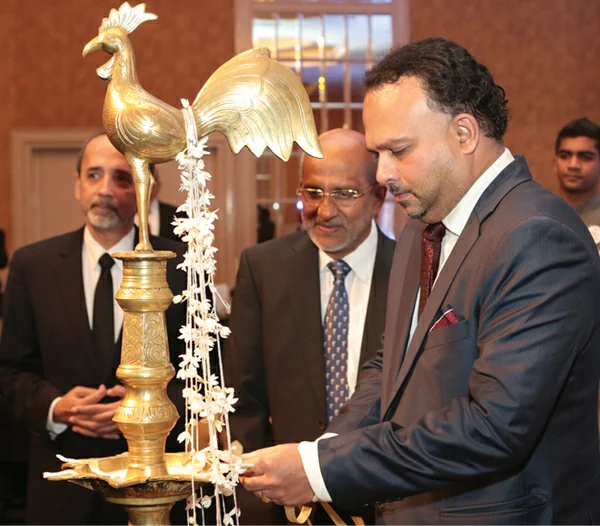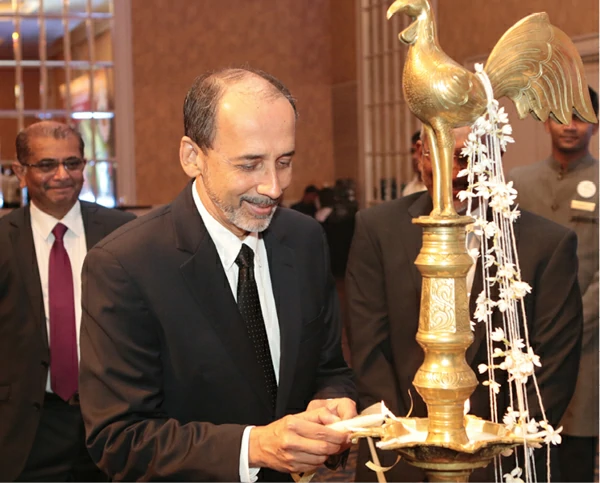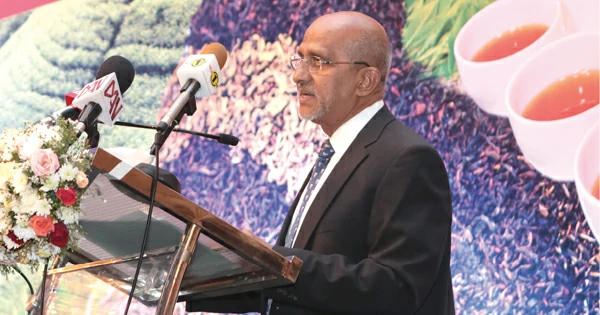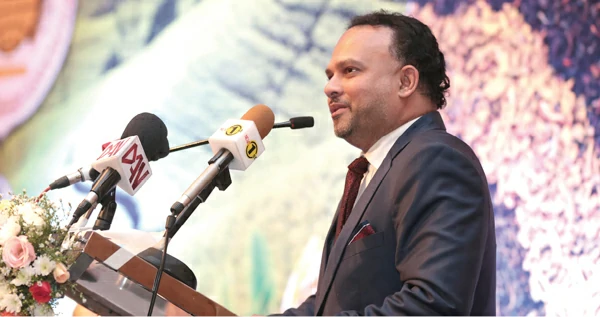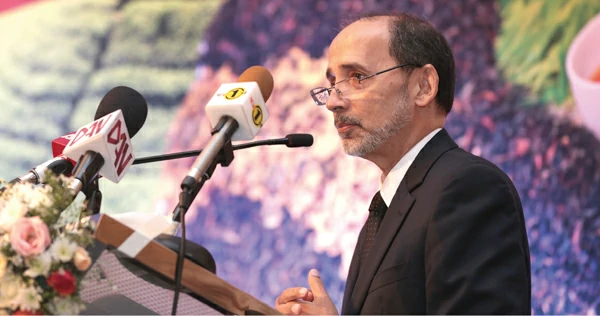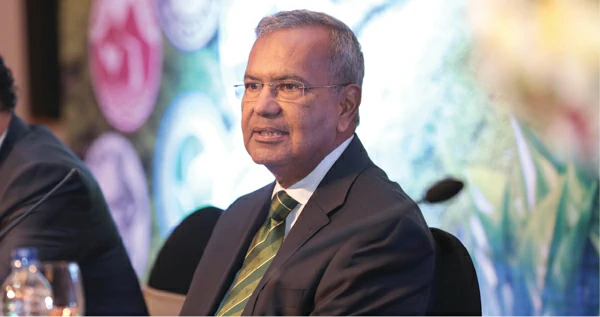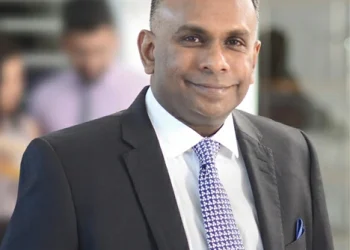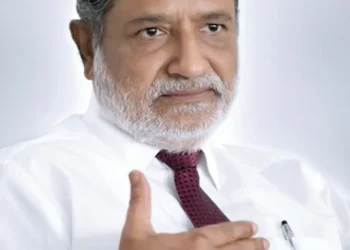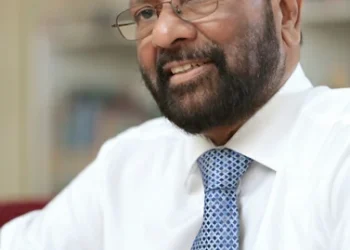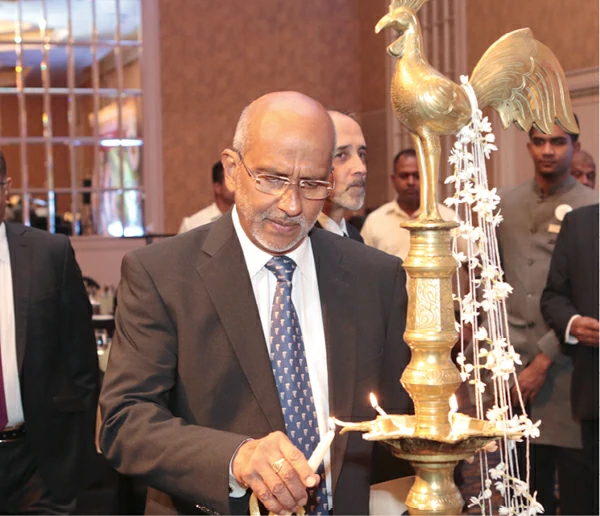
The 122th Annual General Meeting of the Colombo Tea Traders Association (CTTA) saw the election of its Chairman and committee for the year 2016 – 2017. Anselm Perera, Chairman of the CTTA for the previous year (2015 – 2016) and his committee were re-elected for another year. The event was attended by Navin Dissanayake, Minister of Plantation Industries and Chief Guest, Dr Rohan Pethiyagoda, Chairman of the Sri Lanka Tea Board.
Welcoming members of the association, Anselm Perera highlighted the issues the tea trade faces amidst volatility in the world market and highlighted the constructive steps that must be taken to ensure the longevity of Sri Lanka’s largest tea exporter.
He said, “Throughout my sojourn of two years, we have faced numerous odds: the market declining progressively, and continuing uncertainty as to when this ill-fated spell would end… Since achieving the highest crop of 340 million kilograms recorded in 2013,we have seen a successive decline in crop of 2 million and 9 million kilograms in in the years of 2014 and 2015 respectively. Naturally, with auction prices declining sharply since mid-2014, throughout 2015 and still continuing; our annual income from tea exports has recorded a declining trend. Export income for 2014 recorded a volume of 327 million kilograms with an income of 1.63 billion dollars, whilst in 2015, our volume dropped by 20 million kilograms to 307 million kilograms, with an income of only 1.24 billion dollars.”
He attributed this to geopolitical issues, currency depreciations, and the crash in the oil market, which have affected Sri Lanka’s biggest markets in the Middle East and Eastern European regions, most importantly the Island’s single largest market – Russia.
“The Tea Industry Has In The Past Sustained The Economy Of This Country And Has Been The Largest Contributor To The National Economy.”
“The very disappointing auction prices have adversely affected the income of the entire producer community. This had a dominant effect on the income of our brokers. The exporters, on the other hand, had a twofold negative impact. Incomes dropped with lower selling prices for both bulk and value added teas.”
Perera revealed, that while overall cost in all three sectors of the tea trade was high, the industry continued to meet its obligations in terms of paying taxes and levies. He added, producers especially suffered from multiple issues, including the agitation among workers and trade union action.
“The failure to address this sensitive issue of granting planation worker dignity and social recognition through more respectable designations is causing serious migration of labour from plantations to other occupations. This should be given high priority. Changing the mindset of the workers through more interactive methods, thereby creating a greater sense of security and belonging is equally important.”
On the adulteration of tea, the CTTA Chairman said, “An extensive number of key manufacturing factories have placed undue pressure on supplies of green leaves, which has led to the harvesting of extremely poor quality leaves, which factories absorb purely to fill their capacities. This in turn has resulted in poor quality production… We still have too many factories giving rise to unethical practices. However, the problem lies with all the poor teas that we produce. Proof of this fact being evident each week at the auction, some producers still continue to indulge permanently in bad manufacturing practices, and complain of lower prices.” He however elaborated that the status quo at the auction is evidence that factories that adhere to good manufacturing practices for tea get a premium price.
Citing that the last census of tea land was conducted in 2005, Perera requested authorities to update the information with a fresh survey and land registration.
Alluding to the floods earlier in the year, he revealed numerous warehouses of our exporters were submerged, appealing for banks, to accommodate all affected parties with affordable rates of interest and a special line of credit if possible.
“Let us all not forget that tea is a food product and insurance companies must be directed that salvaged tea cannot be and should not be salvaged and sold through dubious means. Instead it should all be destroyed without exception. Let us not risk adulterating our lifeline product -the fine Ceylon tea.”
Another aspect brought up by the Chairman was the Tea Hub Concept, where he urged Regional Plantation Companies (RPCs) and Smallholders who have had reservations about the hub concept to work towards a positive agreement. He added the project would prove to improve exports of value-added products. He further insisted that members work towards the computerisation of the auction system to take the tea industry into the future.
“Another Aspect Was The Tea Hub Concept, Where Regional Plantation Companies (RPCs) And Smallholders Who Have Had Reservations About The Hub Concept Were Urged To Work Towards A Positive Agreement. He Added The Project Would Prove To Improve Exports Of Value-Added Products.”
Hinting at elaborate plants for the 150 years celebration of the tea industry, Anselm Perera concluded, “With all this financial and fiscal burdens our trade must show resilience and move forward. We must all stand united. The tea industry has in the past sustained the economy of this country and has been the largest contributor to the national economy. It still is a major contributor if not the largest. Dear members of the industry please continue in assisting us in sustaining our tea industry, which as you know is our lifeblood. Let us maintain the high standards set by our predecessors and conduct ourselves in accordance with the reputation we inherited as the gentleman’s trade.”
Meanwhile, Minister Navin Dissanayake elaborated on the government’s policy focus with regard to the tea industry, assuring the crackdown on any illegal activities in the trade.
“I agree with the views expressed by Mr Anslem Perera fully. I have inherited a situation that is not to our liking. A situation where tea prices have continuously come down and all of us are under great pressure to face this crisis and move on. To all the doomsayers I wish to say that the tea industry although shaken has a very strong tradition of resilience. And I am sure if we are together on this that we can face it.”
Commenting on the financial situation of the country, the Minister revealed steps were being taken to help producers and sellers adding that the fertiliser subsidy has been introduced to the small owners. He further assured the CTTA that the Ministry of Plantation Industries and Sri Lanka Tea Board would move very quickly on the issues highlighted by them.
“The full gamut of the cycle of management problems has now gone through. We have gone through those models, starting from the old glorious system, the nationalisation process, the privatisation process in 1992 and now we are talking again… I am fully gearing myself up, as the Prime Minister has also requested me to introduce a more productive model that is linked to labour productivity.”
The Minister was firm in stating that he will enforce the law to the letter. He said, “I want to assure you that there are no short cuts. What I have been hearing from the day I took over the Ministry of Plantations is that the quality of our tea is consistently coming down. I’m not going to waiver in my policy on being strict against the adulteration of tea.”
Minister Dissanayake stressed a part of his focus during his tenure as Minister will ensure the purity of Sri Lankan tea brand.
On the crisis of losing the Russian market he said, “We have had crises because we have lost some of our key markets. Russia for example has been a friend of Sri Lanka. And have constantly helped us overcome this crisis but we understand the problem in the country. But unfortunately for us, it is a huge blow. We have to find new markets and I feel China and Iran are very strong markets.”
While Minister Dissanayake agreed the Tea Hub concept was a policy decision the members needed to make in unison, he said there needed to be a rated return with the risk involved in moving ahead with the concept.
“I Hope That When I Leave Office, The Tea Industry Will Be At A Better Place Than It Is At Now. Certainly That Is My Wish And The Wish Of The Prime Minister And The President, Because This Is The Backbone Of Sri Lanka’s Export Industry.”
In addition, he assured that the updating of the map of tea estates has been taken up and that his ministry will do its utmost to see to its completion. In closing, Minister Navin Dissanayake noted, “I hope that when I leave office, the tea industry will be at a better place than it is at now. Certainly that is my wish and the wish of the Prime Minister and the President, because this is the backbone of Sri Lanka’s export industry. And we as the government as policy makers must ensure the long-term sustainability of this industry.”
Supportive of the CTTA and ministry’s plans for the industry, Dr Rohan Pethiyogoda, Chairman of the Tea Board, assured the Tea Board is dedicated to plans that will take the tea trade into the future.
“The tea board has had no choice but to act as a policeman in regulating this industry to implement the high standards that you have set for yourselves to deliver the Pure Ceylon Tea the premium place it enjoys in the world tea market.”
He revealed that while it was a huge undertaking, the Tea Board was currently in the process of conducting a survey of the tea lands. He however highlighted that there were issues to sort out in the process due to the proliferation of smallholders and as most owners do not have the title to their land.
Commenting on the publicity campaign undertaken by the CTTA, Pethiyagoda said the campaign is complicated due to the diversity within the market in which Sri Lanka sells tea.
“The Chinese for example have CT almost as the French see wine a beverage of huge historical and heritage value, whose diversity is celebrated on a day to day basis. The Japanese assign a kind of philosophical value to tea. And in other countries they have their own tastes. In Ireland the practice is if someone dies, after the funeral everyone congregates in some text for a cup of tea. The English as you may or may not know would often revert to a cup of tea whenever their teenage daughter comes home unexpectedly and announces that she’s pregnant. So we have to cater to all these markets in devising a global campaign.”
“Integrity Was An Absolute Key Component Of The Tea Trade At The Time (1960s And 1970s). There Were No Ifs And Buts And Certainly No Excuses For Not Falling In Line.”
Commenting on how the tea industry overcame the nationalisation process of the 1970s, he assured members that the industry will overcome the second revolution in the industry. He added, “A part of what’s going on is that Sri Lanka’s economy has got to the point where we can no longer compete economically with our serious competitors like India and Kenya. India and Kenya are substantially poorer than we are. The Sri Lankan tea plucker gets paid 18 times more than its Kenyan counterpart. That’s a huge difference. So in any situation like that we have to recognise that we can no longer compete at the bottom end of the market.”
Dr Rohan Pethiyagoda, in highlighting Sri Lanka’s need for different markets, stressed that there was also a need for a national appreciation of tea. He said this was one of the challenges the Tea Board faces as there is no well-performing tea producing country that does not have a national appreciation for tea.
Citing the disconnection between the producers and exporters, Dr Pethiygoda stressed the Tea Hub concept will be crucial in linking the two sectors. He added, another area that needed to be looked into is the creation of direct estate exporters, which has been found to be successful and profitable.
Mahen Dayananda, Chairman Pro tem who oversaw the activities of the association during the election of the Chairman and committee, expressed a few sentiments before handing over the mantle to 2016-2017 Anslem Perera, Chairman.
“Integrity was an absolute key component of the tea trade at the time (1960s and 1970s). There were no ifs and buts and certainly no excuses for not falling in line.”
Thanking the Minister for his assurance in being firm against the adulteration of tea amongst other nefarious dealings in the industry, Dayananda said, “We owe it to those who have passed on before us and taught us how to maintain the highest possible standards. Let us be the example to the rest of commercial behaviour in our country.”
